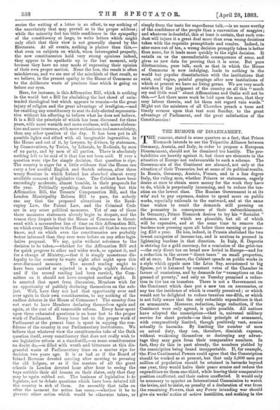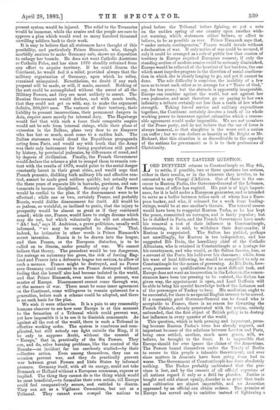THE RUMOUR OF DISARMAMENT.
THE rumour, stated in some quarters as a fact, that Prince Bismarck intends to use the Tripartite Alliance between Germany, Austria, and Italy, in order to propose a European Disarmament, should not be dismissed too hastily. The pro- babilities are heavily against it, but there are elements in the situation of Europe not unfavourable to such a scheme. The Governments of the Continent are alarmed, not only at the situation of their Treasuries, but at some of its political results. Is Russia, Germany, Austria, France, and in a less degree Italy, the ruling men, whether Princes or statesmen, eagerly desire at once to obtain more money for the work they have to do, which is perpetually increasing, and to reduce the tax- ation on the lowest class. The Russian Government is at its wits' end to pay expenses, desires to spend more on public works, especially railroads to the eastward, and at the same time wishes to remit the demands still pressing on the peasantry in consequence of their enfranchisement. In Germany, Prince Bismarck desires to try his " Socialist " schemes, some of which are plausible, but all of which will be expensive, and at the same time to remove the burdens now pressing upon all below those earning or possess- ing .E50 a year. He has, indeed, in Prussia abolished the two lowest categories of income-tax, and is anxious to proceed in lightening burdens in that direction. In Italy, S. Depretis is striving for a gold currency, for a remission of the grist-tax —the only direct tax on bread now levied in Europe—and for a reduction in the severe "direct taxes" on small properties, all at once. In France, the Cabinet spends on public works in a style which appals men like Ldon Say, accustomed to big figures, yet is harassed by constant votes of the Chamber in favour of remissions, and by demands for "exemptions on the ground of poverty," and only on Tuesday promised a reduc- tion in the tax on transfers. There is not a Government on the Continent which dare put a new tax on necessaries, or any tax the incidence of which is exactly perceived ; or which would not be delighted to reduce taxation one-fifth, or which is not fully aware that the only reducible expenditure is that on armaments. Moreover, reduction, large reduction, if the Continent were only agreed, is quite possible. All nations have adopted the conscription—that is, universal military service for short periods—as their principle of armament, with comparatively limited, though positively vast, armies actually in barracks. By limiting the number of men on actual duty, they can, therefore, diminish expense, without weakening themselves or destroying any advan- tage they may gain from their comparative numbers. In fact, they do this in part already, the numbers yielded by the conscription being found insupportable. If, for example, -the Five Continental Powers could agree that the Conscription should be worked as at present, but that only 5,000 men per million of population should be retained in barracks beyond one year, they would halve their peace armies and reduce the expenditure on them one-third, while leaving their comparative position unaffected, and their cadres unaffected. It would only be necessary to appoint an International Commission to watch the levies, and to insist, on penalty of a declaration of war from the remaining Powers, that any Power intending war should give six weeks'. notice of active hostilities, and-nothing in the
present system would be injured. The relief to the Treasuries would be immense, while the armies and the people are sure to approve a plan which would send so many hundred thousand unwilling soldiers back to their work.
It is easy to believe that all statesmen have thought of this possibility, and particularly Prince Bismarck, who, though morbidly anxious to make Germany safe, shows no disposition to enlarge her bounds. He does not want Catholic Austrians or Catholic Poles, and has since 1870 steadily refrained from any effort to acquire territory. If he could disarm the Continent, he would feel it a relief, provided always that the military organisation of Germany, upon which he relies, remained unimpaired. Nevertheless we doubt if any such proposal will be made, or will, if made, succeed. Nothing of the sort could be accomplished without the assent of all the Military Powers, and they are most unlikely to assent. The Russian Government would declare, and with much truth, that they could not get on with, say, to make the argument definite, 200,000 men. The vastness of their territory, their liability to peasant insurrections, their permanent dangers in Asia, require more merely for internal duty. The Hapsburgs would feel that with such a force their composite empire would not be safe from internal risings, while their plans of extension in the Balkan, plans very dear to an Emperor who has lost so much, must come to a sudden halt. The Italian statesmen would dread the Republican propaganda acting from Paris, and would say with truth that the Army was their only instrument for fusing populations still parted by history, by provincial jealousies, by differences of creed, and by degrees of civilisation. Finally, the French Government would declare the scheme a plot to compel them to remain con- tent with the results of 1870, would point to the social danger constantly latent in their great cities, and would urge that French peasants, disliking both military life and effective con- trol, eannot be made good soldiers quickly, but actually need the three years of separate life in barracks, garrisons, and can- tonments to become disciplined. Scarcely any of the Powers would be cordial to the plan, if the disarmament were to be effectual ; while one or two, certainly France, and probably Russia, would dislike disarmament for itself. All would be so jealous, so watchful, so inclined to panic, that the injury to prosperity would be almost as great as if they continued armed ; while one, France, would have to resign dreams which may die out, but which voluntarily she will not abandon. " Ah I but," says M. Andrieux, a grave politician, usually well informed, "we may be compelled to disarm." That, indeed, he intimates in other words is Prince Bismarck's secret intention. Russia is to be drawn into the league, and then France, as the European disturber' is to be called on to disarm, under penalty of war. We cannot believe that theory. The precedent would be too dangerous, the outrage on autonomy too gross, the risk of forcing Eng- land and France into a defensive league too serious, to allow of such a menace. France might be destroyed, and no Power save Germany could consent to see France destroyed without feeling that she herself also had become isolated in the world, and that Prince Bismarck, even more than at present, was master of Europe. Disarmament cannot come through war, or the menace of war. There must be some inner agreement on the Continent, some willingness to remain quiescent for a generation' before such a scheme could be adopted, and there is no such basis for the plan.
We wish it were otherwise. It is a pain to any reasonably humane observer to see how near Europe is at this moment to the formation of a Tribunal which could prevent war, yet how impossible it is to use it to diminish armaments. As against all the rest of the world, there is such a Tribunal in effective working order. The system is cumbrous and com- plicated, but still nobody. can fight outside the Ring, if it be only to suppress Arabi, without the consent of "Europe," that is, practically of the Six Powers. They can, and do, solve burning problems, like the control of the Danube—an incident far too carelessly studied—by their collective action. Even among themselves, they can on occasion prevent war, and they do practically prevent war between great Powers and little States by informal pressure. Germany itself, with all its energy, could not take Denmark or Holland without a European consensus, express or implied. The thing they cannot do is the thing which would be most beneficial,—to formulise their own action, till Europe could feel comparatively secure, and entitled to disarm. They can act as a Vigilance Committee, but not as a Tribunal. They cannot even compel the nations to
plead before the Tribunal before fighting, or put a veto on the sudden spring of one country upon another with- out warning, which statesmen either believe, or affect to believe, to be as possible as ever. Prince Bismarck says that, "under certain contingencies," France would invade without a declaration of war. If only notice of war could be secured, if only it could be arranged as a rule of public law that cession of territory in Europe required European consent, if only the standing section of modern armies could be seriously diminished, Europe would be relieved of the heaviest of her burdens, the one which most impedes progress in the direction of social ameliora- tion in which she is clearly longing to go, and yet it cannot be done. The sole difficulty is suspicion, the inability of a few men so to trust each other as to arrange for a "Truce of God," say, for ten years ; but the obstacle is apparently insuperable. Europe can combine against the world, but not against her own jealousies, and must therefore go on paying to her own infirmity a tribute certainly not less than a tenth of her whole strength. Taking forced service and military expenditure together, the Continent certainly devotes a tenth of its whole working power to insurance against calamities which a reason- able agreement would make impossible. We are not members of the Peace party, and do not believe that the use of force is always immoral, or that slaughter is the worst evil a nation can suffer ; but we can declare as heartily as Mr. Bright or Mr. Richard, that this situation is as discreditable to the capacity of the nations for government as it is to their professions of Christianity.



































 Previous page
Previous page